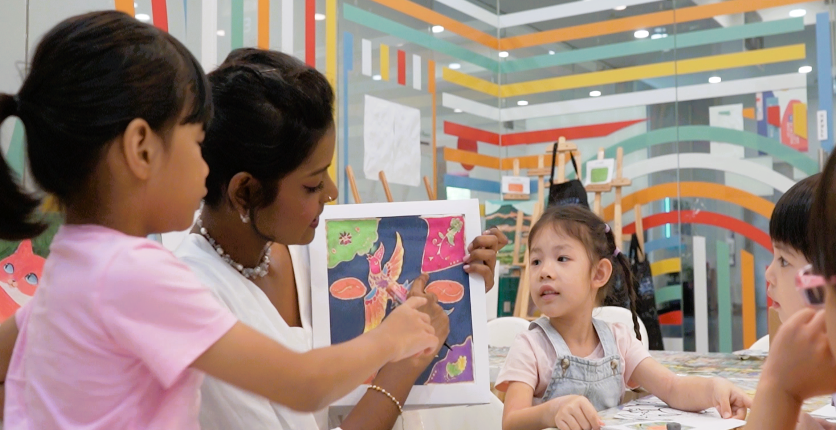Our children are among the biggest investments in our life. We invest in their development, health and well-being daily, and put time, energy and money towards securing a bright and happy future for them.
It’s a gift that keeps on giving – after all, we all want to see our kids become better versions of themselves; to have financial stability, value their health, independence and creativity, and feel a sense of purpose.
But besides providing for them and giving them an education, what else can we do to help them thrive in all aspects of their life? We asked financial, fitness and educational experts for their advice.
1. Set them up to save regularly

When they’re little, they may have a piggy bank, but as they get older, you may want to open a joint savings account with them, or start an account for them once they turn 16 (the minimum age to open an individual account), says Ow Tai Zhi, the co-founder and chief investment officer for AutoWealth.
“Instead of selecting the account for them, we advise guiding or consulting with your kids so that they can better visualise the pros and cons of different bank deposit account choices and take ownership of their financial journey.”
Then, set up a recurring fund transfer to deposit your kids’ pocket money into the account. Encourage them to save their hongbao money, too. This gives them the opportunity to put their financial management skills into practice as they learn how much to save and spend over the course of a week or a month.
“It’s a good chance to teach them healthy financial habits like saving for their needs, differentiating a need from a want, and allocating money to varying needs and wants,” Tai Zhi adds.
“We see mistakes like overspending as part of the learning process. Living with the undesirable consequences of overspending is yet another important lesson (children need to learn).”
2. Help them build long-term wealth

After your kids have learned the basics of saving and spending and are ready to explore ways to grow their money, you may wish to start a term (fixed) deposit account for them, to help them compound their savings.
“They may feel that the pace of compounding through a term deposit account is slow – this is a reflection of positive discovery, but you should encourage them to be patient,” Tai Zhi points out.
3. Teach them about investing

At 18, your kids are old enough to learn about investing in stocks, shares and the like, Tai Zhi says.
They can start with a managed investment solution like investing through a robo-advisor (digital financial advisor) or a mutual fund managed by a professional fund manager.
At this age, your children may have a greater interest in putting money away for the long-term, but they may also have large expenses as they become young adults, start higher education and become more independent. In this case, they may decide to engage a financial professional for advice about making smart investment decisions.
As they accumulate more financial experience, gradually introduce them to securities picking (picking the right stocks) and market timing (timing when to buy and when to sell), Tai Zhi advises.
4. Nurture their mind

Enrichment classes can be beneficial to your children’s education, as they offer a different, more creative and more personalised learning environment, while giving kids advanced academic guidance and encouraging them to think outside the box.
There are numerous types of enrichment classes available, from literacy, numeracy and coding, to language, music, art and everything in-between. Besides helping children acquire knowledge, such classes have been shown to have a positive impact on their cognitive development, including mental processes like perception, memory, attention, problem-solving and reasoning.
The programmes at Model Math (a collaboration between SAFRA and Matrix Math) are crafted to address common challenges kids face when learning math, like forgetting what they have learnt, making careless mistakes, and being confused by tricky math questions. As well as focusing on these areas, the programmes, which are offered to five-to-16-year-olds, train children in reasoning and problem-solving skills.
“Our approach to teaching math extends beyond just working through worksheets or learning methods to solve problems,” says Jason Hiak, Director and Programme Manager at Model Math.
“Using our ‘building blocks’ approach, we aim to develop our students’ ability to solve math problems and to foster self-sufficiency. Our programme enhances intellectual development by building foundational skills, boosts confidence by providing tools to tackle various problems, and sharpens reasoning and problem-solving abilities, preparing students for academic challenges and beyond.”
Sign up for a free trial lesson at Model Math. There is no obligation to commit. Limited slots available. To register your interest and for more information, go to safra.sg/modelmath
5. Expand their creativity

According to Ruthra Sri D/O Mogan, Visual Arts Instructor at Canvas Ark, art allows children to freely express their thoughts, emotions and ideas through images and symbols, without the constraints of language. Art fosters creative thinking and provides children a chance for open-ended exploration, to experiment with different materials and techniques.
Additionally, it develops their fine motor skills, like hand-eye coordination; and teaches them problem-solving and decision making. It engages them holistically, nurturing various aspects of their cognitive and physical development.
Art can benefit other areas of a child’s life, too. For example, it provides a safe and non-judgmental space for them to express and explore their emotions, promoting emotional intelligence and empathy towards others, Ruthra continues. Plus, it teaches children to be patient and appreciate the gradual development of their creations. Delayed gratification is often involved in complex art projects, reminding kids that some things require sustained effort and are worth the wait.
Canvas Ark programmes, designed for children aged four and older, are guided by a team of trained visual art instructors focusing on a holistic approach where children are taught to enhance their imagination to find inspiration.
“At the end of each art session, students are encouraged to share and reflect on their final masterpiece as well as their thoughts behind their art-making process,” Ruthra adds.
“The engagement also develops students’ confidence and self-assurance to make friends with like-minded people.”
Register your child at Canvas Ark and receive exclusive SAFRA Member rates. New students will get 20% off when they enrol for one term and receive a Canvas Ark tote bag and apron as welcome gifts. For more information, visit safra.sg/whats-on/canvas-ark—2024-term-1-new-sign-up-promo
6. Support their physical enrichment

Regular physical activity benefits your children in numerous ways – it relieves stress, helps with weight management, and keeps their mind and body healthy.
Besides ensuring that they get regular exercise every week, it’s a good idea to sign your kids up for an individual or team sport.
“Sports helps their physical, social and emotional development,” says Emir Hamza Ali, Head Coach at FINS Swim School.
With swimming, for instance, kids learn to build endurance and stamina in the water. Interacting with their coach and peers allows them to develop socially and emotionally, and teaches them skills, like discipline, which remain with them for life. While training and competing, they also experience a range of emotions, like disappointment, pride, calm, determination, and so on, all of which help them in their personal growth.
“Moreover, the fine motor skills they develop while swimming can be transferred to other activities, such as playing a musical instrument,” Coach Hamza adds.
FINS Swim School has five locations across the SAFRA clubs, including Mount Faber, Toa Payoh, Jurong, Yishun and Choa Chu Kang. For more information, visit us at safra.sg/fins. Click here to register your interest. All new sign-ups will receive a special gift (T&Cs apply).
Want more articles like this, and other lifestyle content right in your inbox? Download the new SAFRA mobile app and opt in for the eNSman Newsletter – you don’t need to be a SAFRA member to subscribe – and never miss another story!







